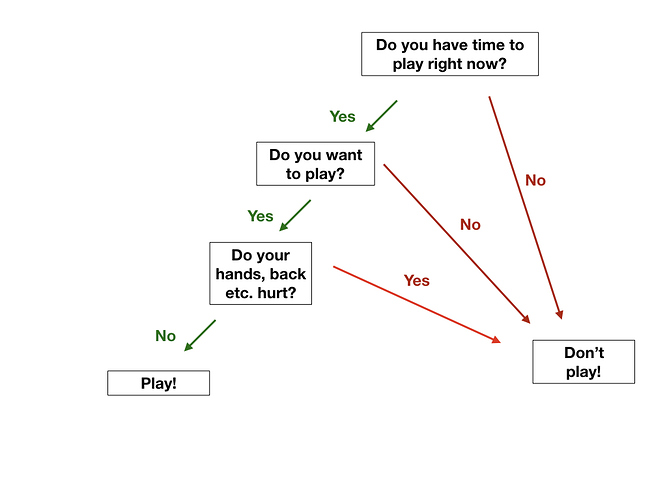A lot of this discussion is ignoring the role of teaching/coaching. Whether the OP intended it or not, discussions of practice time often have a subtext of “if you aren’t getting results, it’s because you just aren’t putting in enough work”. I suspect there are many guitarists who fail to get the results they want despite putting in ridiculous amounts of work.
I think there are a lot of parallels between developing picking ability, and developing golf ability. Tiger Woods famously put in tons of hours of practice from an early age, but it wasn’t self directed. He’s had multiple coaches over the years (including his father), and importantly: he still uses coaches. As the revised saying goes: “It’s not ‘practice makes perfect’, it’s 'practice makes permanent”. There are thousands of amateur golfers who suck pretty badly despite putting in a whole lot of hours, and it’s largely because they refuse to pay for expert instruction. Maybe there have been a few “naturals” over the years, but as with guitar, it’s conceivable that some folks have the combination of athletic intuition and luck that will have them fall into solid technique by chance. In particular, I think many “self-directed” learners fall into the trap of narrowing their range of experimentation as a result of well-meaning but flawed advice, or naive attempts to mimic experts from observation, i.e. “George Benson holds the pick this way, so that’s the way I have to do it if I ever want to be able to play similar lines.”
Even if we accept that some form of intensive practice stage is necessary at some point in a guitarist’s development, anecdotal evidence from guys like Carl Miner suggest that that kind of effort doesn’t need to be sustained for 5 years or longer in order to make a breakthrough. Miner and several others have described periods of a year or two, or even a single summer, where they hunkered down and came out the other side with a technique that hasn’t changed much since then.
Another analogy is performing memorization feats. Someone can spend 8 hours a day for a year trying to “brute force” their way into getting good at memorizing 50 digit numbers, but their performance will be inferior to someone who spends 15 minutes per day practicing the “mnemonic major system” for memorizing sequences of numbers (either because they heard/read about it, or had the good fortune to re-invent a similar system for themselves). Maybe a small percentage of “brute force practicers” would stumble into re-inventing the mnemonic major system somewhere along the way, but that falls more into the “intuitive genius who stumbles into the solution” category rather than the “putting in big hours is the only way forward” category.



 That’s basically how I look at it too.
That’s basically how I look at it too.
 I do appreciate all the responses, though.
I do appreciate all the responses, though.
